|
|
|
how we saw the Playa Naranja ferry
Sunday, February 24 2019
location: Casa Trogon, Agua Vista Lodging, Montezuma, Nicoya Peninsula, Costa Rica
This was our last morning at the casita, though we were in no special hurry to pack up and get out. I'd drunk the last of my coffee yesterday, so I would not be having much caffeine today. This morning I mostly drank leftover kratom tea, refilling a cup of ground kratom from yesterday, though at some point I made myself a single cup of black tea.
The coatimundis made a final appearance, doing their usual boppy emergence from the jungle. They (and the agoutis) like to eat a kind of dessicated "berry" that falls from a tree near the casita (the tree vaguely resembles a white ash), though I've looked at these berries and their berrylets (whatever they're cslled) resemble tiny dry kernels of corn. Today I actually nibbled on one of these berries myself and found the dry fruit is both strongly sweet and sour, suggesting it really is some sort of dry mulberry-like fruit.
As we packed up our stuff, I went through the trouble of actually cleaning the refrigerator and stove, even though Gretchen told me that was something we weren't responsible for. We'd had a bottle of raspberry concentrate that had leaked onto one of the trays, and that's not the sort of thing I want to inflict on anyone.
After filling up on gas in Cobano (which, it turns out, has at least two gas stations), I drove us east towards the Playa Naranjo ferry, following the Google Maps directions. It wasn't long before it was sending us down dirt roads more marginal than the Farm Road back in Hurley. There was even a ford across a river where someone was taking the opportunity to wash the dust off his vehicle.
The route seemed unfamiliar, suggesting there are more than one crappy road leading from Cobano to the airport in Tambor (which was one of the things we passed). East of that, we went through the rugged country where mudslides provided the impetus for a massive roadbuilding project. When we'd come through this area a month ago (also on a Sunday), the road was rough, but there didn't appear to be any work happening. Today, though, we kept being stopped and made to wait while something was happening. Either the road was narrow and a line of vehicles were coming from the other direction or large machines were doing something (in one case, loading massive chunks of woody debris) and there was temporarily no way through. The first such delay, though it took maybe ten or fifteen minutes, was no big deal, since Gretchen had made it so we'd be arriving on Playa Naranja 50 minutes before the departure of the ferry. But then there's be a five-minute hold-up, then maybe a one-minute one. Our buffer was gradually slipping away. There we'd be waiting and the vehicles we'd passed many miles ago (including a big cattle truck full of horses) would arrive and join the queue behind us. At what was to be the last serious delay, less than ten minutes from the ferry, it was hard not to think that the heavily sun-protected person with the walkie talkie who happened to be in charge of our life was being sadistic, especially considering what time it was and how likely it was that everyone of us wanted to be getting on that ferry. Well before we were allowed to proceed from that checkpoint, Gretchen noted that the only way we'd be making the ferry now was if it happened to be running late.
I drove as fast as I could for the ferry, paying less attention to things like clouds of opaque dust, potholes, and residential neighborhoods. And then, there it was, the Playa Naranja ferry landing. But the gate was closed and the ferry was just setting off for its 100-minute voyage to Puntarenas. The next ferry was four hours away, and if we took that, we'd be getting to our hotel after dark. We weren't the only ones who'd just missed the ferry. As we were still absorbing the new reality, that big cattle truck full of horses rolled up. Those horses had a tarp over them, but that sun was strong.
Given all the people who miss the ferry in precisely the way we just did, you would think there would be more things to do at the Playa Naranja ferry landing. But there was barely any shade and the only vendors selling anything were selling garishly-colored homemade soft drinks.
By now, Gretchen had asked Google Maps how long it would take for us to just drive around the north end of the Gulf of Nicoya. Amazingly, this would put at our destination only a half-hour later than the ferry. True, we wouldn't be getting that relaxing 100-minute ferry ride, but driving a car towards a destination is a lot less depressing than waiting four hours for the next ferry.
So that was what we did. We'd sort of forgotten, but the roads north of Playa Naranja are much better than the ones to its south and west, so the drive was about as pleasant as one we might've taken through the Catskills. Not long into the drive, Gretchen took over at the wheel and I made us open-faced sandwiches featuring her faux-chicken salad made with chickpeas, capers, and vegan mayonnaise.
Being that the roads were better, we started seeing the occasional roadkill, though they weren't as numerous as what one sees in the United States. There was a dead iguana on a narrow bridge and a dead coatimundi on the shoulder not far from Puente La Amistad de Taiwán, the cable-stay bridge across where the Gulf of Nicoya necks down into a river.
Further southeastward on pot-hole-free paved two-lane roads, we started seeing lots of makeshift signs (some on old satellite dishes) telling us about a product call vino de coyol. I was able to look this up on the loaner phone; Google must take location into account when autocompleting, because when I typed "vino" it suggested "de coyol". This was how I learn that it was a beverage made from the fermented sap of a species of palm. From the description I read (and I read it out loud to Gretchen), the flavor is chalky, it smells like a combination of vinegar and eggs, and it isn't especially alcoholic. So we didn't stop to get any, even though I hadn't had any water or anything else to drink since we'd left the casita.
On these good asphalt two-lane roads, it was easy to get persistently stuck behind someone driving slowly for no good reason. We always refer to this situation (particularly when there is more than one lane) as being "stuck in the tard line." That's one extreme. The other extreme is some douchebag riding your ass and passing people on the double-yellow line, sometimes only to advance one position in a long line of car. We referred to such obnoxious passing as "dudebroing," and we ourselves did some of that, though only when stuck behind a particularly slow-driving tard.
Then finally we were at our destination, the rumpled lived-in city of Orotina, where we would be staying at the Hotel Iguana Verde. When we walked into the Iguana Verde, a couple ticos looked at us like we'd maybe walked into the wrong place, perhaps because gringos don't often come to Orotina. An employee walked up and asked if we spoke Spanish, and when Gretchen said she did, he seemed relieved. Gretchen then made it clear we were there for the hotel, not for a dinner in the restaurant.
Gretchen had joked that Iguana Verde had a "swim up bar," though she wasn't fully serious. Maybe it just had a regular bar. But no, it indeed had a bar one could swim up to. Our room was in the back and only had a view of the pool, though it had some outdoor space near the pool where we could sit and drink beers and look at our electronic devices as a father and his little daughter splashed in the pool nearby. Overhead, the birds were mostly grackles and doves, though occasionally swallows swooped and soared.
Gretchen's research focused on where we might possibly dine tonight. Orotina is something of a big question mark when it comes to vegan cuisine, though Gretchen found a few Chinese restaurants and places that might be able to throw together a vegan casado. So off we set, originally walking west, away from the center of Orotina. Gretchen had seen a restaurant with a particularly-wide selection, which seemed to offer the most hope of finding something we would like. But the neighborhood along the way there seemed sketchy, and Gretchen wondered if we should keep going. I've never seen her skeeved out by a neighborhood before. As for me, I don't think I've been skeeved out by any neighborhood except one I walked through once in Columbus, Ohio. So I thought we should continue on, and so we did.
Eventually we turned off onto a side street, walking though a neighbood of single-story houses, all of them behind gates and fences, some topped with barbed wire. Every one of these houses had a dog, but, unlike all the places we'd been on the Nicoya Peninsula, the dogs all looked to be purebreds and there were no mongrel dogs in the street. Clearly, the dog culture here was rather different. The people here were different as well. While most of the Costa Ricans we'd seen in other places had been brown people with apparently a lot of indigenous ancestry, many of the people here looked distinctly European, as if most of their alleles were Spanish. Unfortunately, the road that led to the place we were trying to go ended at a locked gate with Prohibido el Paso signs. Since there were no actual Google Maps roads leading to our destination, we had to abandon it, looping back through the neighborhood and being barked at by an endless relay of dogs, most of them small and yappy.
So then we walked back east and to and then through downtown Orotina, looking as we did for a restaurant that might be good for us. We quickly found a grimy looking Chinese restaurant, whereupon Gretchen turned to me and said "I don't think I can!" That made sense to me, and we kept walking.
Continuing the pattern we'd already seen, many of the people we saw in the street looked mostly European. And where there were dogs, they tended to be purebreds attached to a specific person. As for the restaurants, they tended to emphasize the fastness with which it could be obtained, and most of it looked to have involved a deep fryer. Everywhere the air smelled of the easy sustenance of fried chicken. In among these many purveyors of fried food were some odd anachronisms, such as small pinball arcades.
We went to Orotina's central park (which was almost brutalist in its use of concrete) in hopes that maybe the better restaurants would be adjacent to it, as they would be in, say, Manhattan. But this part of Costa Rica was operating under different rules than the ones we were familiar with.
Randomly, though we came upon a humble pizza restaurant called Pizzeria Italiano Fillipo Lazzara that also offered spaghetti, and, after several meals in a row rich in rice and beans, this was what Gretchen wanted to eat. And I could totally see myself fucking up a pizza. At this point I knew that I can get vegan pizza anywhere in the world, since, for me, cheese is no longer essential on pizza. So I ordered a medium "veggie sin queso" and Gretchen went for a bowl of spaghetti. My pizza came out covered with mushrooms, onions, and big slices of eggplant and zucchini. With some spicy pepper oil, it was exactly what I wanted to eat. For Gretchen, though, it was a different story, but without those vegetables Gretchen hates, it wasn't so bad for her. Of course, she was mostly in the mood for that spaghetti, which, when it appeared, was maybe the best spaghetti she'd had at a restaurant in Costa Rica. The main problem with that pizzeria was that it was open to the street, and the sewers that run along the sides of the streets in Orotina (and most of the Third World) are open to the air and smell like sewers, which makes the restaurant (at least beyond the oven-o-pause) smell like a sewer as well. The fat woman out front loudly telling some man she was calling the police on him "to teach you a lesson" was nothing but entertainment. It didn't matter that the restaurant didn't have alcoholic beverages. Gretchen wisely helpfully against it when I considered eating my fifth piece of that pizza, so at the end of the meal I didn't feel bloated and horrible.
And that was it; we walked back to our hotel and I was in bed well before 8:00pm.
[REDACTED]

One of the "mulberries" that the coatimundis and agoutis like to nibble on.
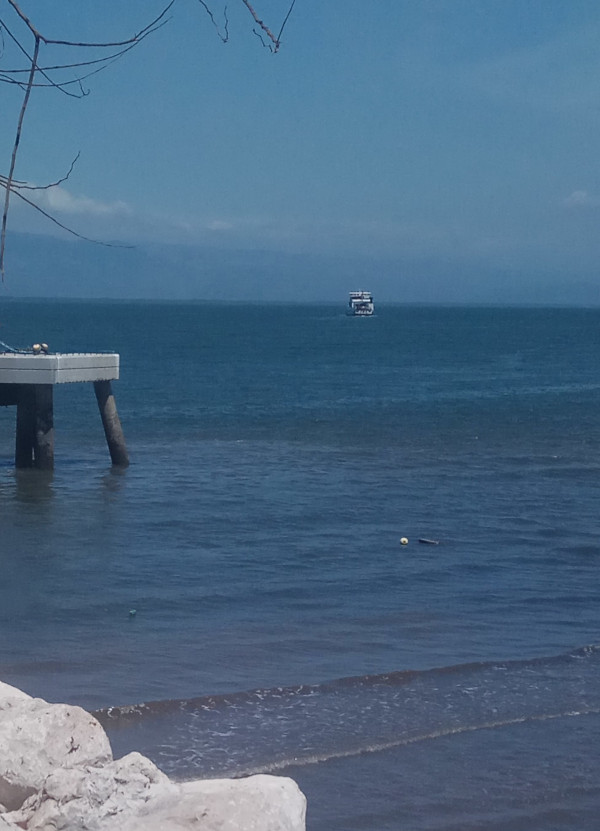
The ferry leaving the Playa Naranja dock is seen as white dot on the horizon. That was where it was at around the time we started our drive around the north end of the Gulf of Nicoya.
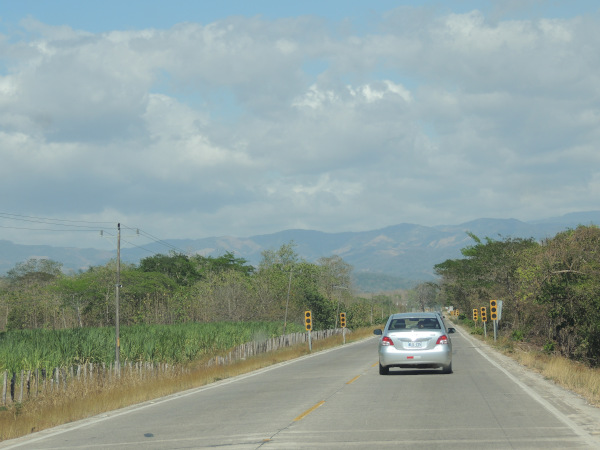
The road to Orotina somewhere off the Nicoya Peninsula. Click to enlarge.
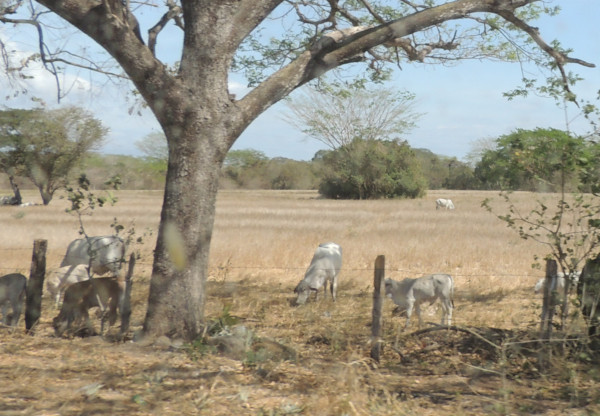
The road to Orotina, with cows. Click to enlarge.
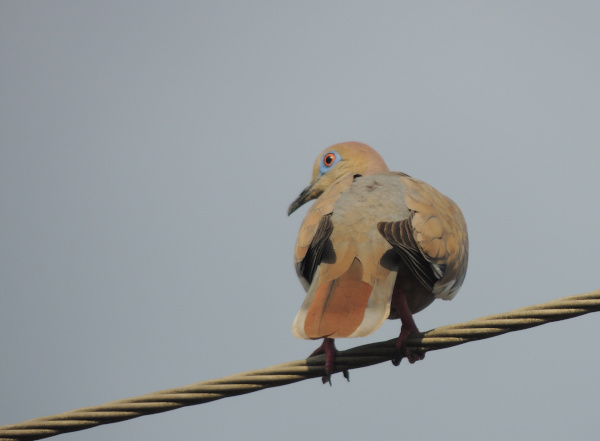
A dove on a wire out in front of our hotel. Click to enlarge.
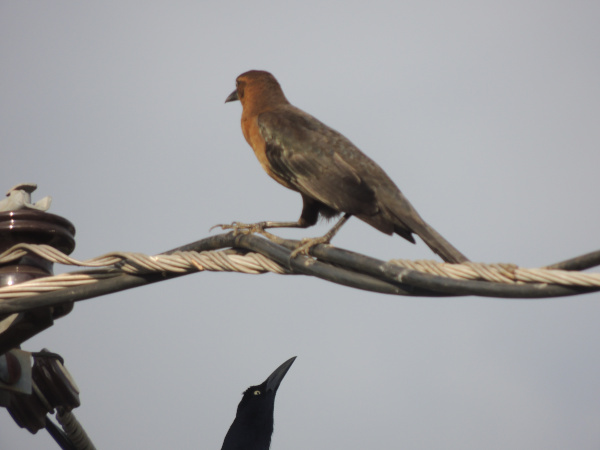
A male grackle looks longingly at a female grackle out in front of our hotel. Click to enlarge.
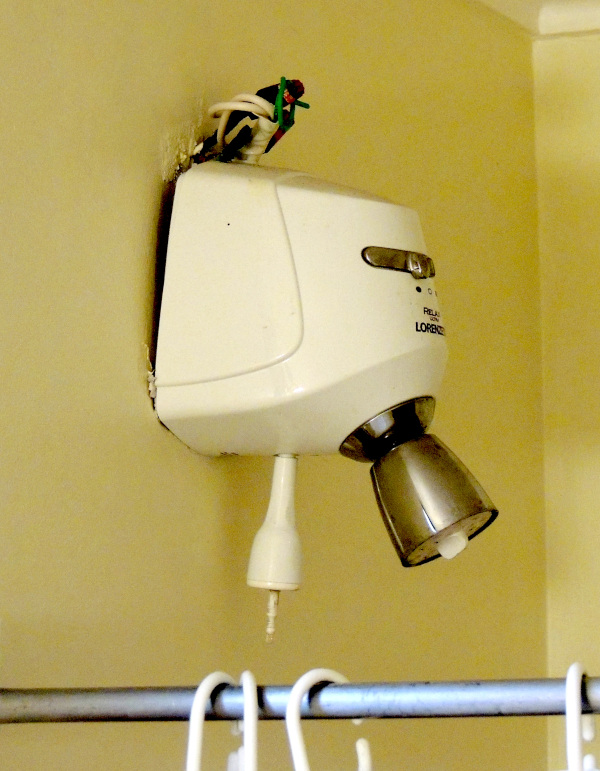
The way water was heated in our hotel room's shower. Note the wire nuts. Click to enlarge.
For linking purposes this article's URL is:
http://asecular.com/blog.php?190224 feedback
previous | next |






